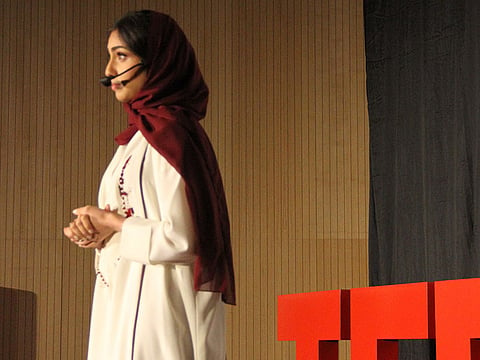Emirati student speaks on the power of make-up
Talk came as part of New York University Abu Dhabi’s annual TEDx series

Abu Dhabi: An Emirati student gave a fascinating insight into the role of make-up in her life, and how it acted as a way of empowerment for her personally.
Mariam Al Harmoodi delivered her talk at the now annual New York University Abu Dhabi’s TEDx series last week. The TEDx series brings together individuals to share interesting stories from their personal lives and how these stories can change people’s outlook on certain issues, and for Al Harmoodi, it was all about giving an understanding on the role of make-up in her life that goes beyond the clichés.
“At the age of eight, mother natured decided my face to host a family of brutes, one after the other, pimple after pimple dominating every corner of my forehead. At family gatherings, [they would ask] are you sure your daughter is washing her face properly,” said Al Harmoodi explaining what caused her to turn to wearing make-up.
“One day, I decided that I had enough. I decided that it was about time that I let the make-up artists do the magic that they claim they could. The make-up artists salvaged my self-confidence and in a few minutes my life was transformed.
“There was one less person pulling me aside to recommend a skin care line, one less whisper, one less stare, and that one less of everything made the biggest difference because that day I debuted my smile to the world,” she added.
Al Harmoodi said that over time, her acne problem got better, but that she kept wearing make-up as it became a part of her.
“I put in so much effort [into applying make-up], but the outcome for me was worth it, how could a 14-year old teenager say no to fitting in. After some time, my skin got better, not entirely, but considerably, so the acne stopped but the make-up didn’t.”
Al Harmoodi added that years of wearing make-up led to another side effect — people who told her she no longer needed it.
“The other day I was feeling adventurous and decided to introduce one of my close friends to this unmasked Mariam, and they said ‘Wow you are really good at make-up’.”
Al Harmoodi pointed out how this created an ever-repeated cycle and a form of double standards that she and other women have to deal with.
“Many women, myself included, we fall into this wormhole. We grow into [wearing make-up] and it becomes a part of us, it shifts from this need to being a want, but then just when we are comfortable with it, we are told that we don’t need it and so we take it off. [But then] we start receiving less compliments, so we wear it again,” she said.
Al Harmoodi was also adamant that wearing make-up was not a way of objectifying herself and it was her own choice.
“I choose to wear make-up because I know from the moment that I step into my first engineering lecture of the day … I will constantly be proving my male counterparts wrong … [and] to go beyond the binary spectrum,” she said.
“I am a female, I am an aspiring engineer, I am strong, and I wear make-up.”
Sign up for the Daily Briefing
Get the latest news and updates straight to your inbox



